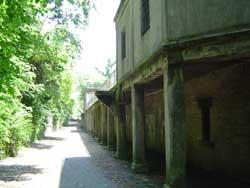Fort Howard Park

- Historic Site
- Nature Trails
- Paved Walking Paths
- Pavilions
- Picnic Areas
- Piers
- Playgrounds
- Restrooms
- Shoreline
- Edgemere-Sparrows Point
About

Learn more about programs and events happening at the fort, offered by the Edgemere-Sparrows Point Community Recreation Office.
Park Enhancement Project
The Department of Recreation and Parks hosted a public input meeting for the Fort Howard Park enhancement project on November 6, 2023. Email capitalprojects-rp@baltimorecountymd.gov with questions or comments.
History
Fort Howard Park's historical significance is its connection with the largest invasion of the United States in history on the morning of September 12, 1814. The British had landed about seven thousand men near the site that later became Fort Howard, as a part of a campaign to capture and burn Baltimore. In coordination with their navy's bombardment of Fort McHenry, the British troops were to march up Patapsco Neck and capture Baltimore from the east. But the British advance was first demoralized when American sharpshooters Daniel Wells and Henry McComas killed their popular commanding general. The advance had been temporarily stalled by the Americans in the Battle of North Point, and finally stopped dead when the British perceived the strength of the American defenses at Patterson Park. Disheartened, they re-boarded their ships near North Point and sailed away to another defeat, in the Battle of New Orleans.
Fort Howard was originally known as North Point, but was renamed in 1902 after Colonel John Eager Howard, a Baltimore philanthropist and distinguished soldier of the Maryland Continental Line during the Revolutionary War. In the 1700s, the site served as an important part of the transportation route between the Eastern Shore and the Port of Baltimore. Known as the "Bulldog at Baltimore's Gate," Fort Howard was also created to protect the valued Baltimore Port. Many of the fort batteries, previously manned by Coast Artillery Corps, can still be seen, although they are now covered by dark ivy and bushes.